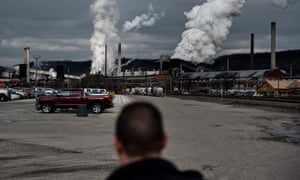EPA chief Wheeler says current soot regulations are adequate despite research that shows stricter rules could save thousands of lives

Photograph: Brendan Smialowski/AFP via Getty Images
The Trump administration has said it will not tighten rules for soot pollution, despite research showing that doing so could save thousands of lives each year.
The fine particles, which come from the burning of coal, oil and wood, penetrate the respiratory system and are linked with heart and lung diseases, higher rates of asthma, bronchitis and cancer.
Under the current standard, which was set in 2012, polluters can emit enough soot to measure 12 micrograms per cubic meter. Strengthening the standards to 11 micrograms could save about 12,000 lives per year, according to one Harvard study of US seniors.
Other research, noted in the government’s own analysis, found that maintaining the soot standard at its current level could allow as many as 52,000 deaths a year in just 47 urban areas.
The Environmental Protection Agency is now proposing to to freeze the standards. The move comes as experts warn the coronavirus pandemic is unequally devastating communities of color that have been disproportionately burdened by pollution. It also follows the announcement of laxer fuel-efficiency rules for cars and other efforts by Trump to advance his political agenda before the November election.
The agency is also retaining its current standard for coarse particle pollution.
The EPA administrator Andrew Wheeler on a call with reporters argued that the agency’s science review “identified a number of uncertainties” and based on those believes that “the current standard remains protective and does not need to be changed.”
Rachel Fullmer, a senior attorney with the Environmental Defense Fund, said: “the administration’s effort to rush this action, without considering public input, is just the latest in a long line of attempts to ignore and undermine the science-based assessment required when [the government] establishes national standards.”
The US government is required to consider new science in evaluating whether air pollution rules are strong enough every five years.
Wheeler disbanded the 26-member expert panel meant to review that research, appointing a smaller committee with less specific expertise in the pollutant to provide advice to the agency. Wheeler populated the committee with scientists from state-level agencies and industry – arguing they had long been underrepresented.
EPA career staff have raised questions about whether the soot standard is protective enough, conflicting with the independent panel.
Source: US Politics - theguardian.com



